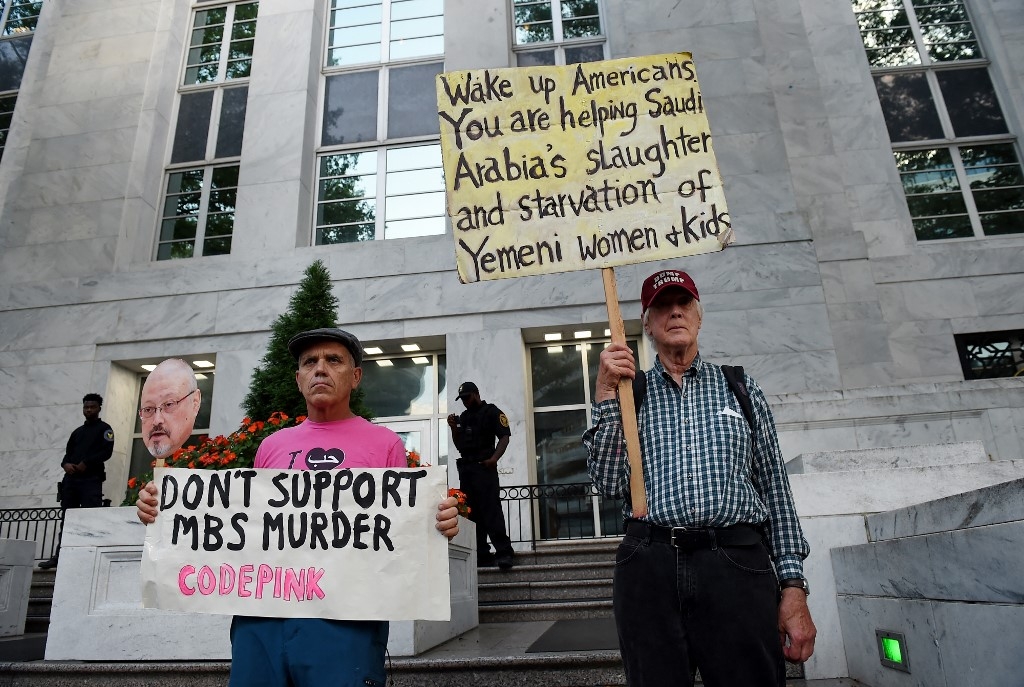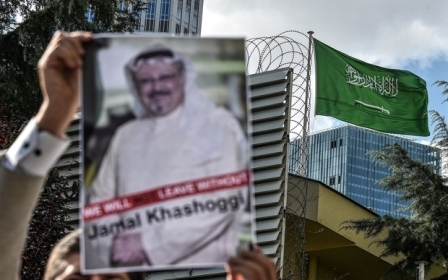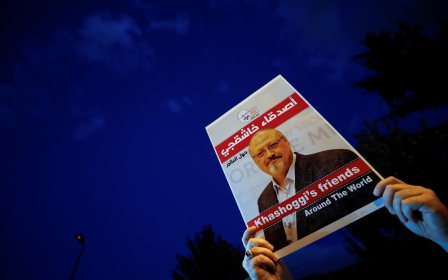US House advances bill to protect Saudi dissidents and suspend arms sales

The US House has voted in favour of a bill set to limit arms sales to Saudi Arabia and hold the kingdom accountable for the 2018 murder of journalist Jamal Khashoggi.
The bill, entitled the Protection of Saudi Dissidents Act of 2021, passed in a bipartisan 350-71 vote on Wednesday, moving the legislation forward.
If passed in the Senate, the legislation would suspend arms sales to Saudi Arabia for 120 days and require a review and potential closure of Saudi diplomatic offices if they are proven to be involved in harassing or spying on dissidents in the US.
It would not prohibit the kingdom from buying defensive weapons.
'This bill provides that beacon of hope to so many who look to this body for protection and safe harbour'
-Gerry Connolly, House Democrat
Led by Representative Gerry Connolly, a Democrat who represents the northern Virginia district where Khashoggi resided, the legislation passed through the House Foreign Affairs Committee last month as part of a broader bipartisan legislative package in response to the Khashoggi murder.
New MEE newsletter: Jerusalem Dispatch
Sign up to get the latest insights and analysis on Israel-Palestine, alongside Turkey Unpacked and other MEE newsletters
"We cannot sit idly by in this body and watch an American resident, my constituent, brutally murdered and dismembered in a consulate of Saudi Arabia in Istanbul, Turkey. We cannot allow that to go unaddressed. The human rights abuse that represents is all too characteristic of the methods used by certain forces in the Kingdom of Saudi Arabia against dissidents," Connolly said when the bill was up for debate on Monday.
"America remains the beacon of hope for those who seek freedom. Basic, simple freedoms... This bill provides that beacon of hope to so many who look to this body for protection and safe harbour," he continued.
The vote comes two months after the release of a report by the director of national intelligence (DNI), which ruled that Crown Prince Mohammed bin Salman had approved the assassination of Khashoggi in a Saudi consulate in Istanbul.
Congress insists on accountability
While US President Joe Biden opted against imposing sanctions on the crown prince, the US Treasury did levy sanctions against dozens of Saudi individuals over their involvement in the Khashoggi murder and other rights violations.
"What we've done by the actions that we've taken is really not to rupture the relationship but to recalibrate it to be more in line with our interests and our values," Secretary of State Antony Blinken told reporters at the time.
Still, Congress has continued attempts to hold the Saudi government responsible for the killing, including the recently-introduced Saudi Arabia Accountability for Gross Violations of Human Rights Act, which requires Congress to be notified of what role, if any, all of the entities named in the ODNI report played in the Khashoggi murder or other gross human rights violations.
Another piece of legislation introduced by Democratic congressman Tom Malinowski earlier last month would impose visa bans on Saudi officials involved in the Khashoggi assassination, including the crown prince.
Khashoggi, a former Saudi government insider and journalist who wrote for the Washington Post and Middle East Eye, was a US resident at the time of his death.
Saudi government agents murdered him and dismembered his body at the kingdom's consulate in Istanbul, where he was trying to retrieve personal paperwork in October 2018.
The Saudi government had initially insisted that Khashoggi left the building alive, taking two weeks to acknowledge that the journalist had been killed. Still, Riyadh claims that the assassination was a rogue operation that happened without the approval of top officials.
Khashoggi's killing pushed Congress to come up with some sort of punitive measures against the kingdom, and the urgency to do so has not died down since it took place over two years ago.
While former US president Donald Trump had moved to shield Riyadh and Mohammed bin Salman from the fallout, Biden, during the campaign trail, called Saudi Arabia a "pariah" state.
Since then, Biden has vowed to "reassess" US-Saudi relations, pausing some arms sales to Riyadh and announcing an end to Washington's support for the kingdom's "offensive operations" in Yemen.
Middle East Eye delivers independent and unrivalled coverage and analysis of the Middle East, North Africa and beyond. To learn more about republishing this content and the associated fees, please fill out this form. More about MEE can be found here.





